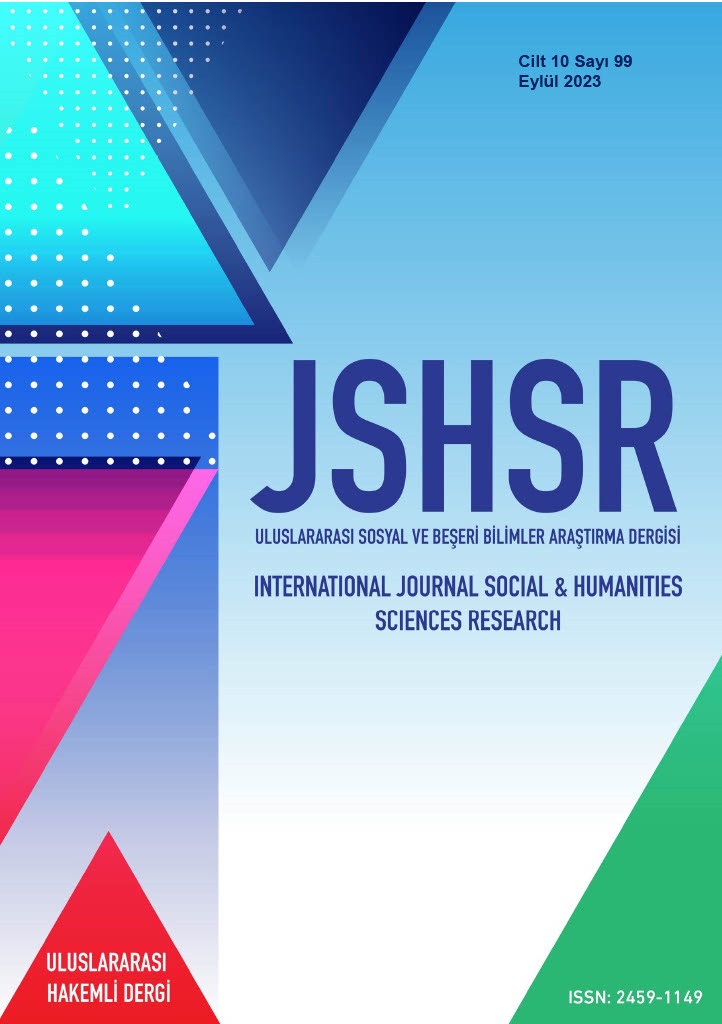An Atheist Philosopher A Mythological Philosophy: Art as an Act of Creation in Camus
DOI:
https://doi.org/10.5281/zenodo.8396556Keywords:
Absurd, God, Art, Creativity, Sisyphus, AtheismAbstract
Albert Camus is one of the most important characters of contemporary literature and philosophy, recognized worldwide. The literature award-winning author witnessed an era dominated by world wars and tried to analyze the complex mood of this era in his literary and philosophical works. According to Camus, human existence cannot be connected to transcendental reference systems that will regulate itself in ethical, political and aesthetic terms. In this context, it should not be expected from a transcendent reference source such as God to contribute to the process in the world. The most obvious reason for this situation is that the source from which contribution is expected is external to the world.
Camus's anti-transcendent thought limits all forms of explanation of human existence to the world. However, this situation is pregnant with an interesting problem: the problem of incompatibility between man and the world. According to the philosopher, man is incompatible with the world due to his conscious nature. Man is an immanent being in the world, but he is not entirely like him. This absurdity, which creates a problem of meaning in the definition of existence for Camus, must be resolved on a philosophical basis. Otherwise, suicide is inevitable. According to Camus, disharmony in the human-world relationship can be regulated by the alternative living possibilities that artistic creativity offers for the reproduction of the human experience. Works of art are the most important resources that will diversify human life and offer new opportunities beyond existing habits. With this life-changing power of artistic creativity, it rebels against stereotypical and dulled forms of being.
Rather than focusing on the origins of an atheist philosopher's anti-God ideas, this study aims to see how an atheist mind defines the human-world relationship. In this context, the thoughts of Albert Camus, who avoided the political atheism of his age and sought solutions to his existential problems on a philosophical basis, were examined.
References
Akbulut, B. (2014). Etik bağlamda Albert Camus’nün başkaldırı felsefesi. [Yayımlanmamış Yüksek Lisans Tezi]. Adnan Menderes Üniversitesi.
Aydın, S. M. (1999). Din felsefesi. İzmir İlahiyat Fakültesi Yayınları.
Camus, A. (1957, December 10). Albert Camus’ speech at the Nobel Banquet at the City Hall in Stockholm, Sweden, https://www.nobelprize.org/prizes/literature/1957/camus/speech/
Camus, A. (1983). Düğün ve yaz. Ramiz Dara (Çev.). Bayraktar Yayınları.
Camus, A. (1997). Sisifos söyleni. Tahsin Yücel (Çev.). Can Yayınları.
Camus, A. (1998). Denemeler ve bir Alman dosta mektuplar. Selahattin Eyuboğlu & Vedat Günyol (Çev.). Say Yayınları.
Camus, A. (2013a). Başkaldıran insan. Tahsin Yücel (Çev.). Can Yayınları.
Camus, A. (2013b). Özgürlük ve devrim. Gülser Erçel (Haz.). Kafekültür Yayıncılık.
Camus, A. (2015). Düğün-Bir Alman dosta mektuplar. Tahsin Yücel (Çev.). Can Sanat Yayınları.
Cebir, B. Ö. (2022). Nietzsche ve Camus’de başkaldırı. [Yayımlanmamış Doktora Tezi]. Maltepe Üniversitesi.
Erdem, H. (1999). Bazı felsefe meseleleri. Hü-Er Yayınları.
Eren, G. (2011). Albert Camus: Yabancı ve Sisifos söyleni ‘Duygusal bir deney olarak saçmanın düşünsel bir kavrama yükselişi.’ Atatürk Üniversitesi Edebiyat Fakültesi Sosyal Bilimler Dergisi, 11(46), 61-74.
Erhat, A. (1996). Mitoloji sözlüğü. Remzi Kitabevi.
Foley, J. (2008). Albert Camus from the absurd to revolt. United Kingdom: Taylor & Francis Group. https://ebookcentral.proquest.com/lib/suleyman-ebooks/reader.action?docID=1886845
Gülsün, F. (2019). Albert Camus felsefesinde uyumsuzluk ve intihar. [Yayımlanmamış Yüksek Lisans Tezi]. Kırıkkale Üniversitesi.
Gündoğan, O. A. (2009, Mart 15). Albert Camus (1913-1960). http://www.aliosmangundogan.com/PDF/ Makale/Ali-Osman-Gundogan-Albert-Camus.pdf?i=1
Homeros. (2019). Odysseia. Azra Erhat & A. Kadir (Çev.). Türkiye İş Bankası Kültür Yayınları.
İmamoğlu, T. & Yazoğlu, R. & Başcı, V. (2020). Din Felsefesi. Eser Yayınları.
Koç, E. (2016). Albert Camus'nün saçma felsefesi: Caligula, Yabancı ve Sisifos söyleni. Sobider Sosyal Bilimler Dergisi, (6), 1-19.
Şerifoğulları, G. (2021). Albert Camus perspektifinden saçma, yabancı, başkaldırı, özgürlük kavramlarının türk sinemasıyla serimlenişi. [Yayımlanmamış Yüksek Lisans Tezi]. Bursa Uludağ Üniversitesi.
Şişman, B. (2006). Küreselleş(tir)me karşısında bir olanak olarak başkaldırı ve Albert Camus. Bursa Uludağ Üniversitesi Fen Edebiyat Fakültesi Felsefe Dergisi, (6), 48-58.
Taylan, N. (2000). Düşünce tarihinde Tanrı sorunu. Şehir Yayınları.
Tiberghien, E. (2017). Albert Camus: Existentialism, the absurd and rebellion. Rebecca Neal (Translated). French: Lemaitre Publishing. https://ebookcentral.proquest.com/lib/suleyman-ebooks/reader.Action? docID=5165012
Yıldıztaş, B. (2010). Jean-Paul Sartre’da ve Albert Camus’da özgürlük kavramı. [Yayımlanmamış Yüksek Lisans Tezi]. Maltepe Üniversitesi.
Yücefer, H. (2005). Deleuze’ün Bergsonculuğuna giriş. Bergsonculuk içinde (s. 7-50). Otonom Yayıncılık.
Downloads
Published
How to Cite
Issue
Section
License
Copyright (c) 2023 INTERNATIONAL JOURNAL OF SOCIAL HUMANITIES SCIENCES RESEARCH

This work is licensed under a Creative Commons Attribution 4.0 International License.


